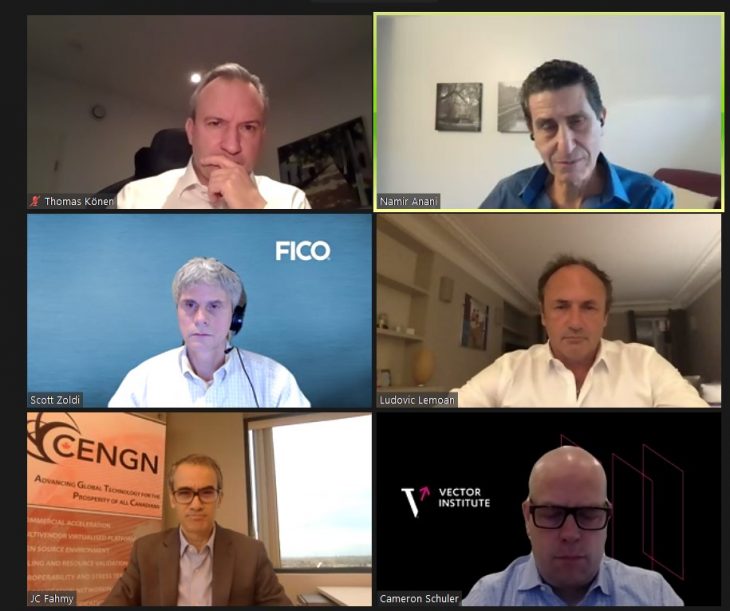
By Lynn Greiner
LIKE VIRTUALLY EVERY COUNTRY in the world, Canada is facing the need to jumpstart its economy to help it recover from the global pandemic. At the Canadian Telecom Summit last week, an international panel of experts looked at the role of AI, blockchain, and 5G in helping countries flourish.
Dr. Thomas Könen, head of the Department for Digitalisation and Innovation with the Federal Association of German Industry, presented the German perspective, much of which may well sound familiar to Canadians.
“Because of the speed of technological development, we are experiencing a problem here – the regulators and the innovators distance themselves from each other, even more than they have been before, because technology is advancing so fast,” he said. “And the regulators in German parliament are not technological experts, so it’s quite hard for them to keep track. That is one of the jobs we have at the Federation, to inform them well.”
German industry has one special advantage, he noted, in that it is the only country in the world which lets companies roll out their own 5G networks independently of telcos. Those campus networks service IoT devices and machinery; companies merely need to apply and provide a business case to get approval.
However, like Canada, Germany is currently in the process of deciding who will be allowed to provide 5G telecom infrastructure.
On the artificial intelligence front, he acknowledged that Germany is not the fastest in the race, but combined with the country’s industrial expertise he thinks Germany could become a world leader.
From France, Ludovic Lemoan, CEO of Sigfox, a service provider for IoT, pointed out his company’s 0G IoT data collection doesn’t compete with 5G, but complements it as a low energy way to acquire those snippets of data emitted by IoT devices. He noted the big challenge is in defining the core value of the data collected. “It doesn’t make sense to start developing a smart city solution, smart everything, if you are not fully convinced, and you have not demonstrated that you will get benefit out of the data collection,” he noted. “So when it comes to collecting data, you find the value. But you also need to know how much it will cost to collect it.”
From a Canadian perspective, said JC Fahmy, CEO, CENGN (Centre of Excellence in Next Generation Networks), we’re starting from a mediocre spot when it comes to innovation – 17th on the World Intellectual Property Organization’s global innovation index, and 22nd on the Bloomberg innovation index. “We haven’t achieved yet our full potential as a country in terms of innovation economy,” he said. “We’re at the beginning of a data age that provides an opportunity to improve on those metrics.”
He sees three pillars for this data age: ubiquitous connectivity, including 5G and other technologies as well as cloud, edge computing, software defined networks, and more. The second pillar is data intelligence, including AI and predictive analytics that deliver value from the data and the third pillar is a trust framework, including infrastructure security, privacy laws, sovereignty rules, and ethics.
“Those three forces together, to me can be a significant engine of economic and social prosperity,” he said. “It’s how we are going to get the full value of digital transformation, and connectivity for all citizens.”
“Canadian businesses are conservative and don’t quickly adopt new technology.” – Cameron Schuler, Vector Institute
He noted the innovation index rates Canada well on inputs – things like government stability, our markets, regulatory environment, infrastructure, education system, and so forth. Where we fall down is in innovation outputs such as growth of startups, the amount of intellectual property that’s commercialized in the country, and R&D investment in relation to our GDP.
But it’s not all mediocre news. Canada was the first country to have a national AI strategy, created to retain our impressive AI talent, added Cameron Schuler, chief commercialization officer and vice president, industry innovation, Vector Institute. “One of our advantages is the talent we produce,” he observed. “The second part of it is our friendly immigration policies.” But Canadian businesses are conservative and don’t quickly adopt new technology. Vector is seeking to change that with a program that works with large businesses (currently 28 are on board) to help them adopt big technology and grow new skills.
On the innovation front he pointed out that funding isn’t necessarily the issue, nor is technical talent. But we do lack people to do sales and marketing (selling intangibles is different to selling a physical product) and product management and other like tasks.
It’s a really interesting time for AI, noted Scott Zoldi, Chief Analytics Officer, FICO. Every country has a different view of what is legal or ethical when it comes to AI, and that’s an issue for its adoption – 93% of the 100 chief data and analytics officers FICO surveyed last year said that the biggest challenge for the adoption of AI was the ethical AI challenge.
“If the organizations that need to consume it don’t feel that they can, we see this trend of people retreating to safer technologies, and less use of data until they get these ethical AI considerations resolved,” he said. “It really talks to the fact that AI has to grow up, and it needs to grow up right now. It has to mature in the same way that software practices have, with very strong standards around agile development and code testing, and regression testing, and all this really strong sanctioned governance work. We don’t generally see that in AI. And as we consume more of this data, and we rely on AI it is going to come fundamentally important.”


